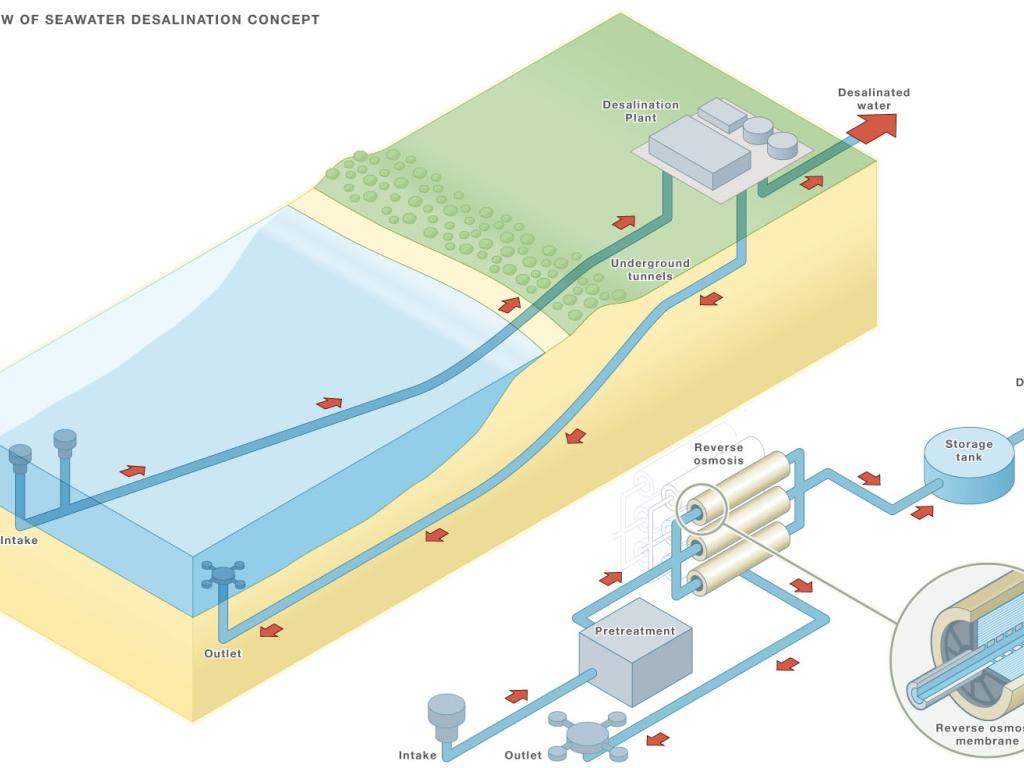BLOG: Desalination: "don't brine it on"

by Lorena Pasquini
The honour of writing this week’s blogpost falls to me, and I have thought long and hard about a suitable subject upon which to pontificate in a suitably well-educated fashion. Indeed, as the blog post rota finally caught up with me, I’ve been scrambling desperately for inspiration this past week. As is often the case when facing the conversational gambits, I am going to resort to ranting.
I decided to grouse about one of my pet hates in sustainability, which is that of desalination. Time and time again I am amazed at the lack of societal and even academic debate on desalination, especially when one compares it to the debate on hydraulic fracturing. Every time I turn round, it’s frack this and frack that – it’s unfortunate you can’t come up with some similarly whimsical saying for desalination (“don’t brine it on!” doesn’t have quite the same ring, does it) with which we might catch people’s attention.
The little debate around desalination I have come across (I’m not saying there may not be more, just that it does not seem to be very visible if there is) tends to revolve around how energy-intensive the process is, and what to do with the waste produced (the brine). These are of course matters for valid concern. My concern, however, goes well beyond the technicalities of the process and its outputs, to focus more philosophically on the issue of why, as humans, do we find it so incredibly hard to learn our lessons.
Our history on the planet has shown us that as we have depleted a resource, we have failed to address the environmental consequences of so doing, and have simply moved on to the next resource, thereby growing and displacing our environmental debt. As environmentalists, we keep saying that we are reaching a point at which we’re unlikely to be able to keep carrying this debt around without massive consequences.
And yet, as we begin to run out of freshwater, we seem, as a society, to be looking over at the sea and saying “Oh look! Water! Goody!” To me, this paints a profoundly disturbing picture. Now, I’m not a natural scientist. Actually, technically, I am. And a good few professors are probably turning in their collective graves at the thought of all that wasted time trying to educate me. Shame. But I digress. My grasp of the natural sciences may sometimes be as tenuous as the traditional snowball’s chances in hell, but as I understand it, we have already crossed the planetary boundaries for climate change, biodiversity loss, and interference with the nitrogen cycle. And we are fast approaching the boundaries for freshwater use, land use changes, ocean acidification, and interference with the global phosphorus cycle.
(If any of the readers, like me, are often engaged in snowball fights in hell when it comes to the natural sciences, planetary boundaries are thresholds or tipping points, beyond which there is a risk of irreversible and abrupt environmental change. The nine Earth system processes mentioned above have boundaries that, to the extent that they are not crossed, mark the “safe operating space” for the planet)
So here’s my thought (ok, ok, here’s my rant): if we are running out of freshwater, is that not a clear message that we should stop consuming so much water? Can turning to the sea really solve our problems? It seems to me to be far more likely to cause us many more problems, the likes of which we cannot even imagine yet … as our history has shown us. We had no idea, for instance, about the climate change problems we would cause as we progressed from coal to oil and carried on “developing”. Displacing our environmental debt does not seem to have worked for us. I keep on saying it: I’m no natural scientist (tenuous grip on concepts, etc. etc.). But I always understood the oceans to be rather fundamental to the balance of life on Earth. I worry that centring the desalination debate around energy efficiency and pollution will distract us from what I fear may be the real problem: what will happen when we take too much water out the sea?
And how much water will be too much water?
Before we dismiss such concerns by saying, hell, there’s so much water in those oceans, we couldn’t possibly make a difference, I’m sure we also never thought we would manage to change the climate.
Join me in saying no to desalination. At the very least, say yes to more research on the implications and consequences of desalination.
Thumbnail: http://counterheg.blogspot.com/2013/02/water-democracy-and-politics-of.html